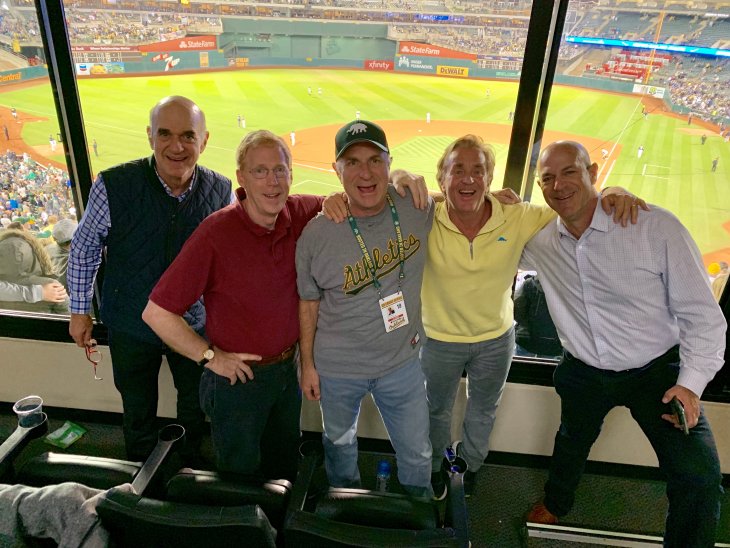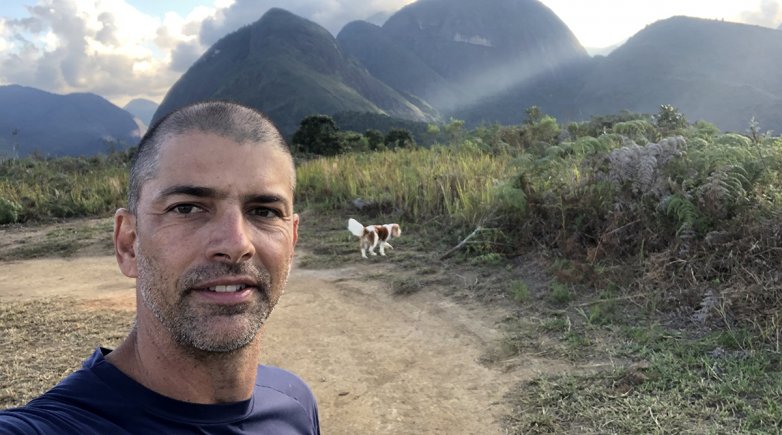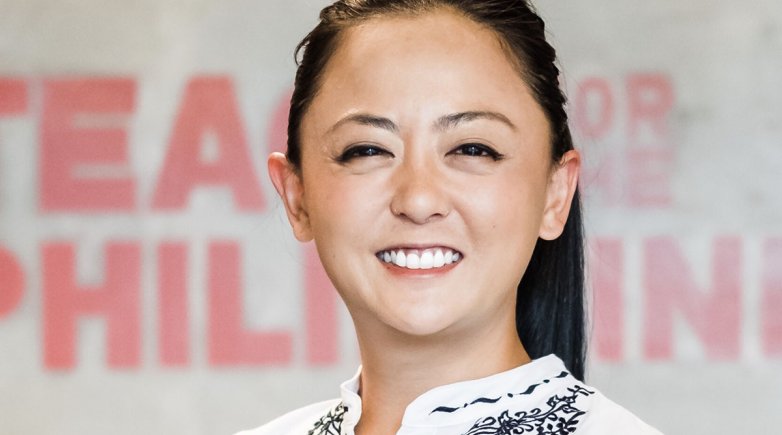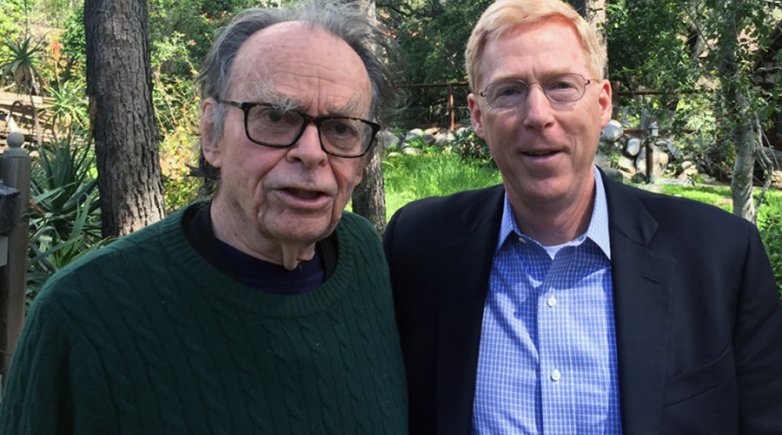The Fisher Brothers

“Exeter was a great place to be. You could be whoever you wanted to be; you could create yourself.”
The Fisher brothers — Bob ’72, Bill ’75 and John ’79 — are close. The California natives live near each other in San Francisco, joke easily and finish one another’s sentences in conversation. They followed similar educational paths, attending Exeter and receiving undergraduate degrees from Princeton and master’s degrees from Stanford. (“We did go to different nursery schools,” says Bill, wryly.) Another shared passion is the game of squash, a sport that the brothers played at Exeter and that Bill and John pursued on an intercollegiate level at Princeton.
In 2004, their love of the sport translated into a generous gift to Exeter: the 33,000-square-foot Fisher Squash Center. “Squash was an important part of our lives at Exeter,” John says. “That common interest of ours made school both fun and rewarding.”
Following in each other’s footsteps
Born and raised in San Francisco, the Fishers are sons of Doris and Donald Fisher, co-founders of The Gap. Each has had professional success: Bob served as chairman of The Gap and is a funder of water conservation, climate, energy and environmental education efforts; Bill is founder and CEO of a private equity firm; and John is owner of the Oakland A’s baseball team, with stakes in two professional soccer teams. They’re equally focused on philanthropy, from the arts to education. Their parents urged them to attend prep school. “Our parents were believers in a strong education,” Bob says. “Our dad wanted us to attend a school with a diverse student body.” The first of the brothers to head east, Bob chose Exeter. When it came time for Bill to decide where to attend high school, he quips, “I figured what was good enough for Bob was good enough for me.” He arrived at Exeter as a prep while Bob was a senior. John followed his brothers to Exeter four years later.
The brothers had different experiences at Exeter. Bob enjoyed the freedom. “I loved being away,” he says. “Exeter was a great place to be. You could be whoever you wanted to be; you could create yourself.” Bill’s first few months on campus were filled with mishaps, which lead to various medical situations, from a patch over one eye to stitches from a fall culminating with a broken collarbone! Adjusting to East Coast weather (“During winter it was overcast every day and it felt like I went months without seeing the sun, just not something I experienced on the West Coast,” Bill says), made for a rocky start. The night before he started classes, John was so homesick that he checked himself into the infirmary with an upset stomach. “Our mom told Bill to visit me,” John says. “Bill comes up from Princeton, we go to lunch and he says, ‘Mom’s worried about you. She’s afraid you’re not going to eat. Don’t be so homesick — it’ll be fine when you have a lot of work to do’.”
Ultimately, the Fishers made it through — and squash was a new experience the brothers embraced. All tennis players prior to arriving at Exeter, they took up squash to improve their games in the off-season. “There were no indoor tennis courts to practice on during the winter,” says Bob. “You either went to a tennis academy or you played squash. Most of the squash players at the time were former tennis players.” Requiring racket control as well as speed, agility and excellent hand-eye coordination, squash is the perfect winter stand-in for tennis. “You have to be in really good shape,” Bill says. “There’s a lot of strategy to the game. Points and rallies last a long time; it’s easier to get rallies going than in tennis. You get an incredible workout.”
Playing for Big Red
Exeter’s boys squash program, founded in 1932, was already renowned in interscholastic competition when the brothers played for Big Red, producing players such as American national squash champion Germain Glidden ’32, and intercollegiate standouts Jack Holt ’39, Chester LaRoche ’44 and Arif Sarfraz ’72, a contemporary and good friend of Bob and Bill. The girls program, established in 1974, has turned out standouts like Demer Holleran ’85, one of the most dominant U.S. women’s squash players.
When the Fishers played squash at Exeter, the game was different. In the U.S., it was played on a different-sized court, the American court. When the U.S. adopted the international game, the Academy courts became obsolete. Back then, there were three full-sized courts; team members practiced on smaller courts, often with up to three players at a time, reducing court time and training. That changed in 2005 with construction of Fisher Squash Center, located in Love Gym. Touted as the most tournament-friendly squash venue in the U.S., the facility is equipped to host national competitions with 10 international-regulation courts, each with glass back walls; gallery space to accommodate 400 spectators; training, treatment and equipment rooms; a lounge; a team meeting room; and a multipurpose space. Now celebrating its 15th year of impact, Fisher Squash Center is used throughout the academic year for Exeter’s varsity and junior varsity teams as well as a club program and the prep physical education program.

The Fishers gained many close friends playing squash. “The game creates a closeness you don’t get as much of in tennis,” John says. At the time, the boys squash coach was German Instructor Werner Brandes. “Once I was playing a kid named Jason Fish,” Bill says. “To get me psyched up for the match, Werner says, ‘Fish, you will hook him and reel him in.’ Jason ended up going to Princeton with me, has become one of my closest friends and lives a few blocks away in San Francisco.”
One of John’s most vivid memories during his senior year was sitting in the locker room after losing a close match. “We were playing an interscholastic tournament and I lost 18-17 in the fourth game. I was crushed,” he says. “I was in the locker room and every part of me ached. But that game was one of the greatest memories of my squash experience. Nothing can compete with that.”
John and Bill later became four-year varsity lettermen in the sport at Princeton (Bill played on three national championship teams); Bob was a first-singles tennis player for the Tigers.
Beyond squash, Exeter has helped shape who the Fishers are as adults. “I think that period of my life between 14 and 18 were my most formative years,” John says. “I was challenged by the weather, academics and competitiveness of Exeter. I think it’s had a greater impact on who I am than any other academic experience in my life.”
Bill agrees. “I’ve spent my career in international business,” he says. “Sports taught me a lot about competition. It’s a lot more fun to win than lose. Hard work at Exeter is part of the experience and that taught me what working hard meant. Independence at age 14 is not easy. You have to figure it out.” Bob says, “It’s an amazing privilege to go to a school like Exeter.”
The Fisher family’s gift is a lasting tribute to the sport they love and lays the foundation for a new generation of Exeter squash players.
Editor's note: This article first appeared in the spring 2021 issue of The Exeter Bulletin.



